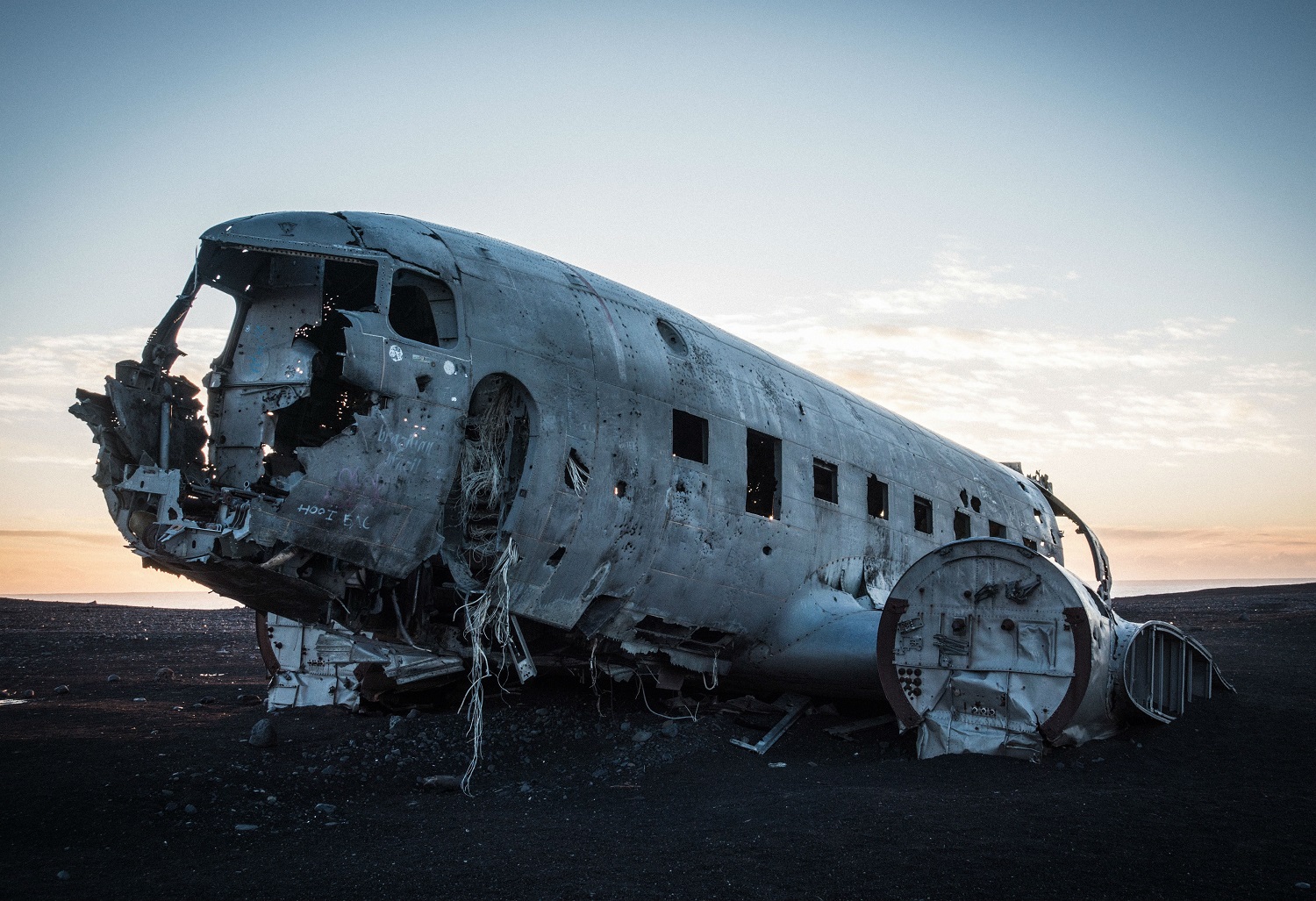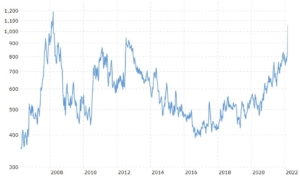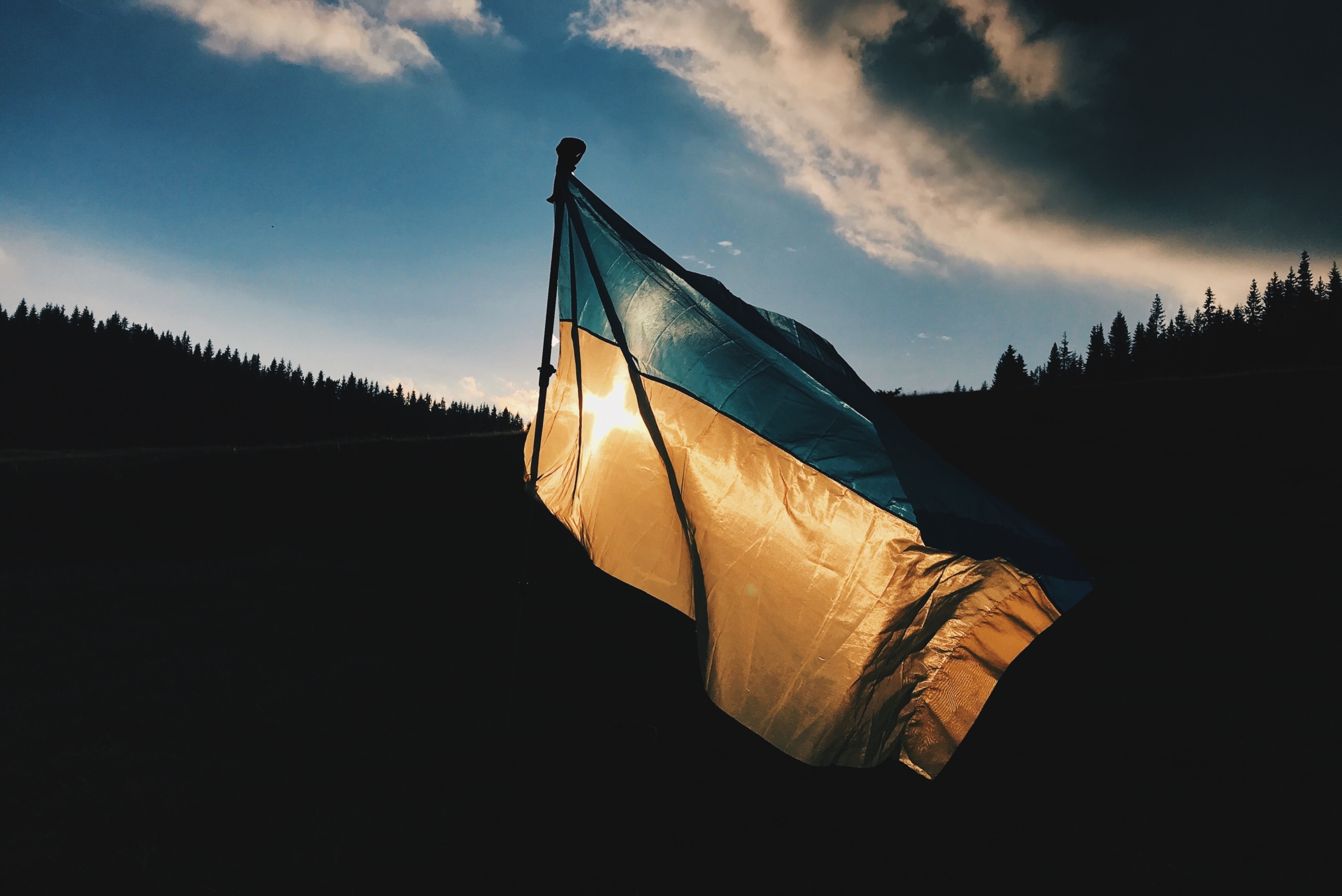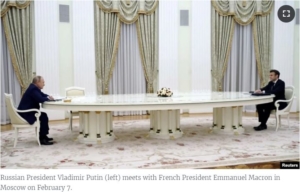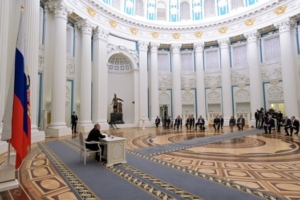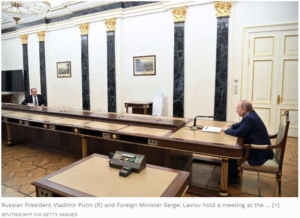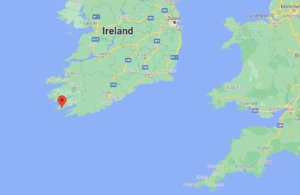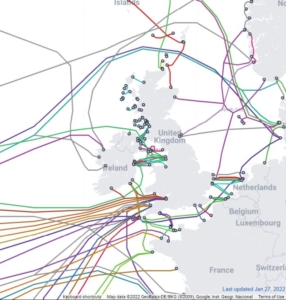Reports from an Unidentified Russian Operative
[NB: Check the byline, thanks. /~Rayne]
A MASSIVE CAVEAT upfront here, as with the first letter attributed to an FSB insider: this could be a psyop, it may be complete balderdash, and this time I have no further attempts to validate the source of the content to follow below.
However these three follow-up letters came through the same manner the first did — a Russian human rights activist Vladimir Osechkin published them to his website. I’m sharing here a translated version by a Ukrainian-born race car driver, Igor Sushko. You’ll note I’ve left Sushko’s interstitial interjections as they appeared in the Twitter threads in which he posted the translations.
Why am I not posting the originals from Osechkin’s site? Because I can’t be certain the site’s traffic is being monitored, or that the site hasn’t been tampered with, including malware and ransomware.
That said, I haven’t yet run across strong opposition to Sushko’s threads or translations. If you’ve seen any objections, please share them in comments.
There have been four letters to date; the first was published late on March 4 and shared on March 5. The second and third are dated March 5 but not translated and shared until March 9 and 10 respectively. The fourth was dated March 9 with its translation shared on March 10.
They’re worth reading as alternatives to U.S. perspective. What about these letters rings true, what doesn’t? Does the perspective here, filtered by a Ukrainian-born translator into English, have any potential affect on democratic nations which support Ukraine?
And what if all of this is an elaborate psyop? What should we take away from it?
~ ~ ~
Letter 2
Tweet thread beginning 10:35 PM March 9, 2022
| 1 | 🧵My translation of the 2nd letter in the series from an active FSB analyst to Vladimir Osechkin, Russian human rights activist exiled in France. Written 1 day later on March 5th. Buckle up for a long thread and definitely please share far & wide. The text is over 1000 words. |
| 2 | I will add clarification comments inside parenthesis where necessary. So, let’s roll: “Here’s the picture with regards to Putin & FSB. |
| 3 | On the one hand, he is supported and respected, but if you slightly dig deeper, it’s a collective feeling for the image, thanks to which FSB has the power that it really has. To serve (in the FSB), there is one unforgettable rule. |
| 4 | To most, this rule even appears rather natural and is taken for granted – To criticize Putin’s image is to betray your own interests. |
| 5 | In reality, Putin was never a spy. It’s actually an open secret. But here (FSB) our doubts concerning the authority’s competence is equivalent to treason. |
| 6 | Who makes the decisions? I can tell from our own work that there is no single decision-making post – intrigues and “people who are trusted by the top” lobby the teams, decisions, etc. In light of this, sometimes facts and even events are “created.” |
| 7 | I personally do not have contact with Putin, but if I were to assess him as a target for recruitment as an asset and develop a situational profile, then we have the following as fact: |
| 8 | 1) Narcissistic disorders, possibly due to childhood complexes, as methods of overcoming them. |
| 9 | 2) Rejection of family life – no information about his parents, secrecy around his children and his own personal life. This requires psychological compensatory mechanisms in search of close relationships. Such psychotype is prone to “cross dominance” in relationships. |
| 10 | 3) He tries to surround himself with the type of people whom he respected/feared in his childhood psychotype, over whom he now has power. |
| 11 | 4) Strongest psychological resistance of personal responsibility for difficult decisions. It is a result of the 1) above, but in turn, this also leads to a mechanism for denying his own guilt/responsibility even to himself. |
| 12 | From this, considering 3) above, we can say the following with near absolute certainty: Putin is psychologically incapable of refusing with justification, an offer from his closest circle. |
| 13 | But this also leads to the conclusion that he does not guarantee anything to anyone by saying “yes”, because to guarantee is to take responsibility. |
| 14 | With high probability I assert that in case of an offer from his closest circle, he will agree with every offer, delegating the control/responsibility to the person making the offer. |
| 15 | Psychologically, he will not have any contradictions in “agreeing” to mutually exclusive proposals – “you yourself are to blame if you failed.” |
| 16 | Next. The current situation is such that no one anywhere has reliable information on complex issues. The reports that go through me are then corrected by the leadership to be politically correct – more positivity, less negativity. |
| 17 | These already rosy reports are then again massaged to be even more rosy – and false. So, everything is very good here – I know this for sure. |
| 18 | At the top level of the authorities, several realities exist in parallel and they are all real in their own way. Power, just like money, is an illusion. It exists exclusively due to belief in it. It is an axiom of a theory of control. There is no Russia as a whole picture either. |
| 19 | It sure is something that Putin could find himself completely closed off in a “universe” belonging to someone in his close circle – there’s a reason he is afraid to even allow his ministers near him. This is something we are kept in the dark about and I do not have the details. |
| 20 | But what I know for sure: Volodin (Chairman of the State Duma of Russia) flew to Cuba prior to the war, and on the day of the invasion he wrote that it’s critical he fly to Nicaragua. No mention of war. |
| 21 | The lion’s share of people close to the main Towers sincerely believed that there would be no war. And they understood that such a war would be a trap. This is worth noting. |
| 22 | Did Shoigu (Minister of Defense) think that the war will turn out this way? No. He is not a real military man. He fully believed in the picture of the army that he painted Putin. |
| 23 | I am personally aware of such facts concerning this fu#&er, who is at the highest level of our military, they’d be too rich to turn into an anecdote (a Russian joke). |
| 24 | When for example Generals are demanded to provide rapid reports on victories, and they (chain-of-command) continue to pass on the order (for the report) downstream while screaming & cursing, until finally some Sergeant agrees to make the report in exchange for military leave, |
| 25 | after which he takes a video depicting American work in Afghanistan, erases the sound, and hands it off up the chain-of-command. |
| 26 | And the recipient up the chain, and so on, until it reaches the tables of the Command, who completely believe the report, and they hand it off to Shoigu (Minister of Defense of Russia), who then hands it off to Putin. |
| 27 | There are serious discussions about how Putin is lately absorbed by finding “mystical meanings.” From numerology to the shamans somewhere up north. Can’t say anything concrete – it doesn’t fit into any analysis. |
| 28 | But that the Czar is not the Czar is a fact. (Putin is not in charge anymore) He wants to be the Czar, but this is a trap of illusions and a field of object manipulations. Prerequisites are established for this from all perspectives. |
| 29 | About the internet – yes, we can shut down the internet. Technically. Can also sew closed your own mouth, in order to stop drinking. Technically, yes. Attempts to shut down (the internet) will be made. The worst is that various departments will compete for greater efficiency. |
| 30 | All kidding aside, my superiors sometimes say this in all seriousness: “North Korea lives in this regime (without internet) – and it’s fine.” |
| 31 | Anyway, war psychosis is scary – we can screw up a lot of things in this mental state. How this will end is unknown. Look at the big picture: We react in real-time. The law was passed criminalizing those who post “fake info against the military.” |
| 32 | Kadyrov reasonably responded that his structures belong to the RosGvardia (National Guard), meaning his members can’t be charged with this law. Another law can be passed (to exclude others). |
| 33 | And then one that excludes judges (from this law), then a law for those in the special forces, and then for the tax officials. This is not proper systematic work, but some kind of parody of case law in the United States. No exclusions should be made. |
| 34 | Which is why I believe in your actions (Vladimir Osechkin, human rights activist). No, I don’t believe that prison tortures will be reduced as a result of your actions. But the percentage of those who perfectly understand what is going on is rather high. |
| 35 | Within our ranks (FSB) as well as within the military. I need points of support so as not to feel like a doomed renegade. If this layer is also lost, that’s it, the lid of the country’s coffin will be hammered shut. |
| 36 | Soon everything will change. I am afraid to even think how and when exactly – we’ve entered the impossible state of “as it used to be” but do not fit into the state of “how we’d like it to be.” |
| 37 | We are now at a classic fault point in the country – as in (Evgeny) Messner’s “Mutinous War,” which was reworked into “Gerasimov’s Doctrine.” |
| 38 | Need any points of support (fulcrum) to maintain sanity even just minimally. And those who’ve already gone off the rails – they don’t care anymore. |
~ ~ ~
Tweet thread beginning 3:45 AM March 10, 2022
| 1 | 🧵My translation of the 3rd letter in the series from an active FSB analyst to Vladimir Osechkin, Russian human rights activist exiled in France. Dated March 5th. Buckle up for a long thread and definitely please share far & wide. The text is over 1400 words. |
| 2 | I will add clarification comments inside parenthesis where necessary. So, let’s roll: |
| 3 | “I will start with the big picture. There are people with particular talents in the field of analytics (inside the FSB), who are retained here in the bureau not just for the value they bring, but to ensure that they remain under “control” (of the Russian government). |
| 4 | For example, and I am one of them, such people may never return to an ordinary life, the system does not allow for such a shift. “There” (outside the FSB) we are considered dangerous. This is my department’s policy. |
| 5 | I am here, and now I definitely understand why we won’t have any more Mercedes or BMWs (in the country), but will have a ton of Ladas. In order (for Russia) to have Mercedes, we must behave according to protocol which is optimized and controlled. |
| 6 | Without political decisions and knee-jerk demands of the authorities (that affect an agency like the FSB). This isn’t about “catching up and overtaking,” but about methodical and painstaking work, with a strategy rather than a wishlist. But in Russia this never happens. |
| 7 | We have plenty of resources within the FSB to switch to a method of systemic analysis, but nobody fuc$ing wants it. We can meticulously calculate variations, build models, and identify problems. |
| 8 | But on a whim, some bastard who is usually not even from our structure – I’m talking about senior officials, politicians and their hangers-on) can suddenly declare that “here (in the department) the mood is too defeatist, |
| 9 | and you are casting a shadow on the leadership of some state structure with which we want to avoid conflict.” There is professionalism and there is loyalty. |
| 10 | Loyalty is demanded – and is highly valued at critical times to elevate the leadership (within FSB) or to satisfy the “requirements from the very top.” |
| 11 | While we work on some pedophile & human trafficking cases, I say from first-hand experience, no one interferes. And we get results. And once we deliver results, then we are assigned to more political cases. |
| 12 | Analysts should not have emotions. There are forecast models, there are statistics, there is sociology. “Believe or don’t believe” should not exist (in his line of work). But it exists. |
| 13 | And those who are ready to nod and say “We will find a solution and solve the problem” are the ones climbing the ladder. Problems from such an approach are only piling up. |
| 14 | Now on to your question – the situation is out of control. Any model has a time horizon in planning with parameters for performance within functional boundaries. Now there is none of this: most input parameters are junk based on political decisions. |
| 15 | – reliable data on the military prospects of the operation. There are whole sets of data from various departments and services, and they contradict each other, which means there’s nothing. |
| 16 | -a well-developed model of economic management under the current restricted conditions (sanctions) |
| 17 | – reliable information with regards to loyalty of the elites in the financial and political sectors. |
| 18 | – reliable data on the impending extreme measures to be implemented in Russia. |
| 19 | (I POSTED THIS PARTIAL TRANSLATION AS I AM EXHAUSTED AND WANTED TO ENSURE I COMMITTED MYSELF TO POSTING THIS AS SOON AS POSSIBLE – I WILL KEEP TRANSLATING AND I WILL POST MORE SOON) |
| 20 | What we do have: |
| 21 | – a constant stream of new data on “emergent” economic problems that “cannot exist”: |
| 22 | partial failures in the supply chains of raw materials can stop complex processes, including the production of strategic products (military), the (non) functioning of single-industry towns and industrial agglomerations; |
| 23 | – the expected explosive growth of banditry and crime, due to the superposition of several factors including: economic problems, a decrease in the mental stability of the population from stress + war psychosis + compounded nervous state from isolation measures |
| 24 | – situational planning of the political sort without assessing the long-term [and even short- and medium-term] prospects for their introduction; |
| 25 | – segregation/compartmentalization of workflow and services and departments due to the loss of a unified management system; |
| 26 | – the growth of foreign policy threats, including military – there is no guarantee that Japan will not attack the Kuril islands or that Georgia will not attack Ossetia-Abkhazia, Syria and Libya is preparing for attacks against our units); |
| 27 | – the complete dysfunction of the former economic model as there is no more stabilization fund, the exchange rate is not stable, and the old system of employment is now impossible in principle. |
| 28 | There can’t be any forecasts with such inputs. We have now jumped from anti-crisis management to crisis management. And to be honest, we just entered catastrophic mode. |
| 29 | A catastrophe as a condition is characterized by “it will not be as it was, and how it will be, we will not know until it happens.” |
| 30 | Paradoxically, the country’s survival under such conditions for some time is only possible because of the autonomy of certain parts of the government. To be blunt, a police chief of a small town knows what he needs rather than adhering to the “universal commands from the center.” |
| 31 | Here and now, this and only this can extend the survival of structures and systems, but if we take a horizon of a year or more, then this is the death of the (centralized) government as whole. |
| 32 | As I predicted, Nabiullina (Head of the Russian Central Bank) will now be dragged, people around her will be prosecuted. |
| 33 | This will pulverize the banking sector into the trash – what will happen with the exchange rate and policy of the Central Bank – I am not an economist by education, don’t even want to think about it without systematic study. |
| 34 | The worst option – they will put in place the one who offers to turn on the printing press to “hold the situation.” |
| 35 | For the same reason [I am not an economist] I will not assess the prospects of the commodity market, but it has gone off the rails: everything is being bought out, which means the demand is causing crazy swings. |
| 36 | As a result, normal logistics are impossible as warehousing and transportation are calculated from the model of optimal average values, when there is the most uniform load to its full potential. |
| 37 | And when you need to produce, transport, store, and sell 2-months supply of goods in just 3 days, and then go idle for 2 months – that’s fu#Ked. At the same time, not the best is happening with loans – rates are rising, and access to money is only getting more difficult. |
| 38 | Burnout. Personally, I’m already burned out – indifference is seeping in, the desire to bust my ass is gone. It’s impossible to work toward a result with such inputs. |
| 39 | You want me to give you “plans for victory” and put on a smart face “according to the law of wartime” – OK, you won. Now that’s what I do. And burnout will be absolute, rampant. |
| 40 | Now the internal mobilization of the power resources (riot police, etc.) will begin, and when it is done without a time horizon, it is a catastrophe. |
| 41 | All departments are in elevated mode, everyone is looking for enemies and saboteurs, everyone is saving the country from the inside. Those who do not burn out – that’s who we should be afraid of. It will be classic lawlessness and fascism. |
| 42 | Many of our people (FSB) also believe that “now it is necessary to be tough with enemies,” and anyone around can become an enemy. This psychosis is happening against the backdrop of the professional deformation of one’s personality. This is a moral shift. Irreversible. |
| 43 | The Scariest. If at the top they decide to issue a command of “military expediency” – hell will be here immediately. Military expediency is lawlessness. The right of force. A person is psychologically wired to seek justifications for all his actions. |
| 44 | The law is only a tool that sets the boundaries. Because “for the sake of your country” you can shoot out the legs of a suspicious person, and you can kill a person who refuses to submit to a soldier. |
| 45 | Military expediency unleashes total freedom for internal justifications. In fact, it is the same revolution when force overthrows the establishment. |
| 46 | I have no universal forecasts except for the old one: By May-June we won’t have what to fight with (weapons), whom to fight with (soldiers) and how to support all this. But the turning point (of the war) will be in the coming days. I suspect for the worse. |
| 47 | And even if we choose to activate strategic aviation – it will only make it worse for us. Frankly, the United States is allowing us to get sucked into this conflict further. They understand that we are now trapped. |
| 48 | Markers we are still monitoring: |
| 49 | The West preparing programs that conditionally fall under the category of “oil in exchange for food.” For us. This will mean that the trap has been slammed shut; |
| 50 | Sudden changes in personnel in the government bloc, which we will not be notified about in advance to ensure additional control. This will speak of panic governing – a system of abrupt and consequential personnel decisions solely based on emotions; |
| 51 | Total nationalization. Personally, unlike many of my colleagues, I prioritize this marker above all others, as after this we will economically turn into Venezuela even without war and sanctions, this will be de-facto pillaging. |
| 52 | Military ultimatums from other countries. But we can also make our own ultimatums for now. |
| 53 | Desertion by the highest-level military-political representatives of Russia to other countries. We are tracking this nominally, but we do not have a “clean” special service (FSB) after all. It’d take long to explain nor is it very pleasant. |
| 54 | Improvement of the economic situation in Russia within the next 3-5 years is impossible in all available scenarios. |
| 55 | Although, of course, there could be exceptions: highly developed aliens 👽 who choose to specifically support us, we will learn to cast spells🧙♂️; something else from this opera (a Russian expression meaning something from a similar story). |
| 56 | And currently unknown is how Asia and the Arab world will react when hunger strikes these regions in the summer – grains will not be exported this year (from Russia). |
| 57 | It’s difficult to succinctly summarize such topics, but I hope that at least partially I’ve answered the question. You simply must hamper the torture processes within the prisons – there is no one beside you who can possibly do it. |
| 58 | Uncontrolled violence will be such that the bloody arrival of Bolsheviks to power will seem like a light warm-up. I don’t think we will be able to avoid the terrible, but it is worth at least to soften up the hell that is coming. |
| 59 | (END OF TRANSLATION) |
| 60 | Full translation accessible in article form: http://igorsushko(.)com |
~ ~ ~
Tweet thread beginning 3:51 PM March 10, 2022
| 1 | 🧵 My translation of the 4th letter in the series from an active FSB analyst to Vladimir Osechkin. Written March 9th. As consequential as the 1st translated letter. Buckle up for a long thread and definitely please share far & wide. The text is over 1200 words. |
| 2 | Vladimir, good afternoon!
This is probably the first time that I’ve been able to write to you in the daytime during a weekday – everything is upside down now. |
| 3 | Under different circumstance, this information would look like utter nonsense, but right now, I am afraid, this won’t be the end of it. |
| 4 | First, we (FSB) are seriously evaluating a version that the current events of war with Ukraine is a war between the US and China, in which the Americans simply set us up and are using us. Now I’ll try to explain succinctly & clearly. |
| 5 | (This is the new ‘nonsensical’ working theory that the FSB analysts are being tasked to work on)
A global clash between the USA and China was unavoidable. |
| 6 | After the war started in Ukraine [at least here in this correspondence I don’t have to use the term “operation”] the cost of resources has risen globally, especially energy. |
| 7 | The main casualty of these events is China and our side (Russia) provided China certain guarantees, which I can personally confirm – that everything will end quickly (invasion of Ukraine). Which is why China has been tolerating the situation. But this was before. |
| 8 | The American situation is such that owners of the industry and oil drilling are in essence the same corporations, and that helps with the internal balance: |
| 9 | They make money on drilling when oil is expensive, and when it’s cheap – from industrial development. This is a bit blunt, but it provides the necessary insight into their approach. Shales (oil fracking), unlike the classic method (of oil extraction), is easy to stop and start. |
| 10 | Now the US will make an agreement with Venezuela and Iran. They can buy out Venezuelan light crude with a crazy discount. And the opening of the Iranian oil (market) will obviously be perceived with hostility by Saudi Arabia and UEA. |
| 11 | The Yemeni conflict is also relevant here, and a row of other factors which I will ignore for the sake of simplicity. But it all leads to the fact that the US had already made preparations for these negotiations in advance. |
| 12 | The US has basically set a trap for us, almost analogous to the trap set for Iraq in Kuwait, when Saddam Hussein was being convinced that for a “small conflict (incursion)” there will be no response. He entered Kuwait and “Dessert Storm” began. The beginning of the end of Iraq. |
| 13 | We were receiving similar signs that the US will not get involved, which has been confirmed from a military perspective. |
| 14 | China can absolutely give us a harsh ultimatum to end the war to stabilize the price of oil. If this happens, I don’t want to make predictions – it’d be on the horizon of catastrophic events. |
| 15 | Russia’s image is so negative in the eyes of so many countries because of the war, that the US can easily pressure the Europeans to impose sanctions against China in case China decides to maneuver around the current sanctions against Russia (to help Russia). |
| 16 | China’s high dependence on exports coupled with its dependence on commodity prices would result in a fatal blow if the cost of commodities goes up because their domestic market will disappear (Chinese population can’t afford the increased price of goods). |
| 17 | Not only that, Xi Jing Ping was considering a takeover of Taiwan in autumn – he needs his own small victory to be re-elected for his 3rd term – there’s a colossal internal fight between the elites. |
| 18 | Now after the events in Ukraine, the window of opportunity (to take Taiwan) has been closed. This gives the US an opportunity to blackmail Xi and also negotiate with his rivals on favorable terms. |
| 19 | In this instance, it is us (Russia) that set this trap for China through our actions (in Ukraine). We won’t be able to admit this out loud, even an assessment of scenarios from current conditions is “not entirely appropriate.” |
| 20 | Hence the desire that the secret becomes open: Yes, this is only a working version, but it exists in our structures (in the FSB). |
| 21 | Second – the evolution of the current situation.
Now about our other plans, which go beyond any bounds of insanity. Sanctions against Russia have reached a level with no precedent in history. The only thing that Putin is right about – this is essentially equivalent to war. |
| 22 | The current approach with sanctions leaves Russia without any chances. Now the matter may not be limited to threatening Europe – the chance of hostilities, albeit of localized nature, can be considered to be historically high. |
| 23 | Ukraine is a monstrously large front, there are smaller fronts. For example, if we were talking about Moldova, the military operations would really be limited to several hours. With the Baltics – several days, but there’d be artillery hits first. |
| 24 | (WILL CONTINUE TRANSLATING AND WILL PUBLISH IN A BIT. INTERMISSION FOR NOW) |
| 25 | Actual threats of conventional rocket strikes against Europe [not bluffs] in the event of further sanctions can no longer be dismissed. |
| 26 | Supporters of such an approach, who exist among those with influence on the decision, muse that in a sordid case we will simply be crushed by waiting until an internal implosion and collapse from inside (in Russia). |
| 27 | In addition to the rockets, we have the capability to conduct a massive cyberwar – the internet can be shut down (by Russia inside Russia). Such a possibility exists and it’d be difficult (for the West) to respond symmetrically (since Russia won’t have internet anyway). |
| 28 | And the external war should reduce the internal tension and redirect the aggression outward. However “should” – doesn’t mean it’ll be so. |
| 29 | There’s also a more realistic [but I can’t say good] plans of a massive disinformation campaign that we are prepared for the war and sanctions for years to come: This should pressure the Ukrainians psychologically – “It won’t end quickly, better to surrender” and also the West. |
| 30 | I suppose that various government powers (in Russia) could start pushing their own plans (on how to proceed). That will simply lead to even more chaos (in Russia). |
| 31 | I won’t talk about the economy – it’s like discussing the nuances of pacifism while being nuclear-bombed.
The terror has strengthened – there are no internal instruments to hold the (economic) situation inside the country. |
| 32 | But terror is a complicated and expensive thing – it should become temporary. It’s like holding your breath because the air is poisoned: If you can escape the area, then the action is justified. But if you hold your breath for “an hour” – you saved yourself from poison but… |
| 33 | Systemic decisions with a positive outcome do not exist. There is no Ukrainian political power that we could delegate the authority just for the optics. |
| 34 | If we present Yanukovich (former President of Ukraine that was Putin’s asset, who dismantled the Ukrainian military pre-2014), it will only expose how bad things really are here. No single strategically important city has been taken in Ukraine. |
| 35 | Kherson and Kharkov were considered the most pro-Russian. Pro-Ukrainian protests are not dying down in Kherson despite the presence of our soldiers. In Khrakov things are much worse. |
| 36 | Just summarizing the gist without getting into the details.
There is another piece of information that is critical. The “Plan for Victory” in the FSB is being painted as such: |
| 37 | Zelensky will be pressured into signing a fluff peace agreement recognizing Crimea as Russian, and Luhansk- and Donetsk-oblasts will become LDNR. LDNR will be the focus of our negotiators in terms of nuance, etc. But it’s just a distraction. |
| 38 | The key clause would be about demilitarization, which would essentially ban Ukrainian intelligence services, and most importantly dismantle their counter-intelligence. |
| 39 | And here our people (FSB) already see the prognosis: Over a number of years, it would be possible for us (FSB) with some minimal help from the GRU (Russian Military Intelligence), to carry out a total cleansing of the socio-political field in Ukraine. |
| 40 | And after all this, we could install any government in Kiev. With high probability this plan will become dominant for the Kremlin with strategic correction, although the scenario is insane and aggression on other fronts is not being cancelled. |
| 41 | In theory, the plan does have potential, but how it will be in practice is unknown. There will be no military victory, only something like this |
| 42 | Lots of nuances, but most important – our side will be able to breach such agreements after they’re signed anytime, when there’s strength to turn the tide. |
| 43 | Then it won’t be the military but the “black crows” who will be executing the “second phase,” arresting those accused of breaking the agreement from the Ukrainian side. |
| 44 | This scenario is not as crazy as the others, but it is completely contingent on the idea that Kiev can actually be pressured in the negotiations. |
| 45 | We are now working the Western contacts at the highest levels – looking for countries who will support our position and to put pressure on Zelensky. |
| 46 | It could be another bluff, it could be an analogue of Wenck’s army in our current reality. Overall, as I’ve been saying, the level of chaos here is quite high. |
| 47 | In economic terms, we are falling and everything is very predictable: the abyss is fervently winking at us. 😉 |
| 48 | We are limited in our ability to verify all data, but consider it important to disclose this information for the purpose of informing of the existing threats to global security. Нет войне! (No to War!) |
| 49 | (END OF TRANSLATION) |
| 50 | Full translation in article form here: http://igorsushko(.)com |
~ ~ ~
I lean toward thinking this is mostly true, though even if true it’s presented by someone whose work is tightly defined, who is used to working toward an expected outcome if Letter 1 is an accurate assessment of the FSB’s condition. They live in one of the parallel realities they describe in Letter 2, section/tweet 18.
A narrow reality might explain perceptions about the oil market although it doesn’t explain why they don’t acknowledge their personal risk because they live in a Hotel California situation and there can’t be many occupants in that space.
All four letters taken together, I suspect the only way out for Putin is to pin the blame on someone or some department and make a massive example of them. If he uses FSB he will encourage those who can destroy him. If he goes after the military, there are retired military who may not take this well.
It’s a recipe for a lot of radioactive tea, nerve gassed shorts, and inconveniently placed windows.
It would be best for everyone if one of Putin’s leadership cohort chose to fall on their sword to get him out of this mess, but if Putin is perceived as weak in the same way this purported letter writer does, they’re not going to leave Putin at the helm.
This alleged FSB insider still suffers from delusional thinking inside their parallel reality, too — no reformulation of Russian intelligence will give them control over Ukraine’s democracy. A purged and rejuvenated Russian intelligence, however, might eventually seat a leadership in Russia which looks more like Ukraine’s.
But I don’t recommend anyone hold their breath.
Two things which really must be discussed whether these letters are true, partly true, or not true at all:
— food aid and not just for oil, given the likelihood of massive crop failures ahead which will affect large portions of the world;
— the trap, because there is one though it doesn’t yet appear fully set.
Go ahead, bring it in comments once you’ve finished digesting this.


